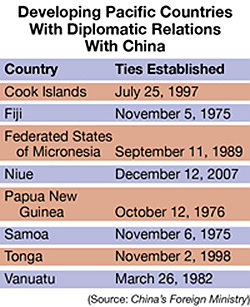 |
|
PRACTICAL PROJECT: Fiji's Prime Minister Commodore Voreqe Bainimarama (center) attends the groundbreaking ceremony of a China-sponsored road improvement project in Fiji's Sigatoka Valley on May 27 (XINHUA) |
What's more, China's assistance policies are transparent with strict management. In April 2011, the Chinese Government issued a white paper on China's foreign aid, which made a comprehensive description of aid policies, methods, management mechanisms and international cooperation.
China's assistance is also practical. Chinese projects meet the needs of the countries. Generally, they are all useful but unaffordable projects for the countries. China aims to carry out measures Chinese Premier Wen Jiabao announced at the UN High-Level Meeting on Millennium Development Goals in 2010, said Cui Tiankai at the Post-Forum Dialogue.
China will focus on infrastructure projects including schools, hospitals, roads and ferries, said Cui. It will also send more agricultural, medical and technical experts to the region, increase the number of local trainees, reduce the debt burden of the least developed island countries, and consider other island countries' debt moratorium requirements.
These measures will definitely be welcomed by the governments and people of the Pacific.
It is worth noting that the Pacific island countries have also provided assistance to China in difficult times. In 2010, China suffered several major natural disasters such as a 7.1-magnitude earthquake in Yushu, Qinghai Province, in April and a devastating mudslide in Zhugqu, Gansu Province, in August. Leaders of Pacific island countries sent condolences to China following the disasters. Despite its tight budget, Samoa donated more than $50,000 to the Chinese Government.
Pacific islands are particularly prone to devastating effects of climate change. Some of them have clearly felt the threat of rising sea levels, and some suffer from severe natural disasters.
However, most of these countries are remote and underdeveloped. Their ability to deal with climate change is limited. This is why the representatives of Pacific island countries often react fiercely at international climate change conferences.
China has always supported the reasonable demands of Pacific island countries on climate change. In recent years, it has donated to the Pacific Regional Environment Program to support its climate change mitigation projects, and actively participated in climate change conferences hosted by island countries.
China and Pacific island nations have great cooperation potential in developing renewable energy and handling climate change. Pacific island countries are rich in solar, geothermal, wind, biomass and tidal energy. And China has accumulated experience and technical strength in the development of renewable resources.
In April 2010, the China National Committee for Pacific Economic Cooperation held a China-Pacific Island Countries Forum on Eco-tech Cooperation in Beijing to promote new energy cooperation aimed at dealing with climate change. Ten memoranda of cooperation were produced at the forum.
Just as then Deputy Prime Minister of Vanuatu Sato Kilman said at the forum, the good relationship between China and Pacific island countries can lead to fruitful results on climate change projects and technology transfer.
There is reason to believe that climate change will become a highlight of cooperation between China and Pacific island countries.
Over the years, China has actively organized people from the Pacific islands to study or attend training in China. It has also sent art troupes to perform in these countries and sent sports coaches as well as medical teams to work there.
In 2010, China established a Confucius Institute, the first in the region, at the University of the South Pacific in Suva, Fiji. And China's Xinhua News Agency established its first branch in the region in Suva, too.
With strengthening political and economic relations between the two sides, especially with more Chinese tourists and entrepreneurs coming to the region, their cooperation in culture, education, sports and public health will keep deepening.
China and developing Pacific countries face the same task of economic development as well as similar challenges in the international arena. China has proved with concrete actions that to promote relations with these countries is its long-term policy.
The author is an assistant research fellow with the China National Committee for Pacific Economic Cooperation

| 